Intro
Protect against Meningitis B with the vaccine, preventing meningococcal infection, sepsis, and brain damage, especially in infants, toddlers, and young adults, ensuring immunization and public health safety.
Meningitis B, also known as meningococcal group B disease, is a serious and potentially life-threatening infection that affects the brain and spinal cord. It is caused by the bacterium Neisseria meningitidis serogroup B. The disease can progress rapidly, and if left untreated, it can lead to severe complications, including brain damage, hearing loss, and even death. The development of the meningitis B vaccine has been a significant breakthrough in the prevention of this devastating disease. In this article, we will delve into the importance of the meningitis B vaccine, its benefits, working mechanisms, and key information related to the topic.
The meningitis B vaccine is a crucial tool in the fight against meningococcal disease. According to the World Health Organization (WHO), meningitis B is responsible for a significant proportion of meningococcal disease cases worldwide. The disease can affect anyone, but it is most common in infants, young children, and young adults. The introduction of the meningitis B vaccine has been shown to significantly reduce the incidence of the disease in vaccinated populations. For example, a study published in the New England Journal of Medicine found that the meningitis B vaccine was highly effective in preventing meningitis B disease in infants and young children.
The meningitis B vaccine works by stimulating the body's immune system to produce antibodies against the Neisseria meningitidis serogroup B bacterium. These antibodies help to protect against infection by recognizing and attacking the bacteria, thereby preventing the disease from developing. The vaccine is typically administered in a series of doses, with the first dose given to infants at 2 months of age, followed by subsequent doses at 4 and 12 months of age. The vaccine can also be given to older children and adults who are at increased risk of contracting the disease.
Meningitis B Vaccine Benefits
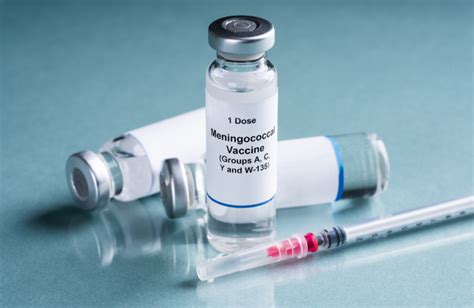
The benefits of the meningitis B vaccine are numerous. Some of the key advantages of the vaccine include:
- High efficacy: The meningitis B vaccine has been shown to be highly effective in preventing meningitis B disease in vaccinated populations.
- Safety: The vaccine has a good safety profile, with most side effects being mild and temporary.
- Protection against severe complications: The vaccine can help to prevent severe complications of meningitis B disease, including brain damage, hearing loss, and death.
- Reduced risk of outbreaks: The vaccine can help to reduce the risk of meningitis B outbreaks, which can have a significant impact on public health.
How the Meningitis B Vaccine Works
The meningitis B vaccine works by stimulating the body's immune system to produce antibodies against the Neisseria meningitidis serogroup B bacterium. The vaccine contains a component of the bacterial outer membrane, which is recognized by the immune system as foreign. This triggers an immune response, which helps to protect against infection. The vaccine can be given in combination with other vaccines, such as the Hib and pneumococcal conjugate vaccines.Meningitis B Vaccine Side Effects
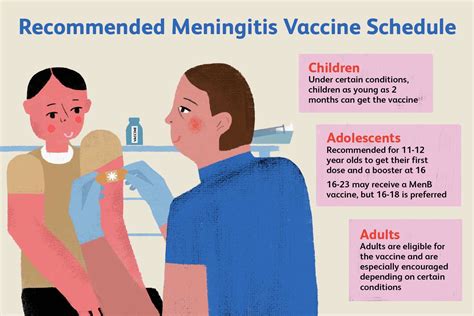
Like all vaccines, the meningitis B vaccine can cause side effects. Some of the common side effects of the vaccine include:
- Pain, redness, and swelling at the injection site
- Fever
- Irritability
- Drowsiness
- Loss of appetite
- Vomiting
- Diarrhea
These side effects are usually mild and temporary, and they resolve on their own within a few days. In rare cases, the vaccine can cause more serious side effects, such as allergic reactions. It is essential to discuss any concerns about side effects with a healthcare professional.
Meningitis B Vaccine Schedule
The meningitis B vaccine schedule varies depending on the age and risk factors of the individual. The typical schedule for infants is: * First dose: 2 months of age * Second dose: 4 months of age * Third dose: 12 months of ageOlder children and adults who are at increased risk of contracting the disease may require a different schedule. It is essential to consult with a healthcare professional to determine the best schedule for each individual.
Meningitis B Vaccine Effectiveness
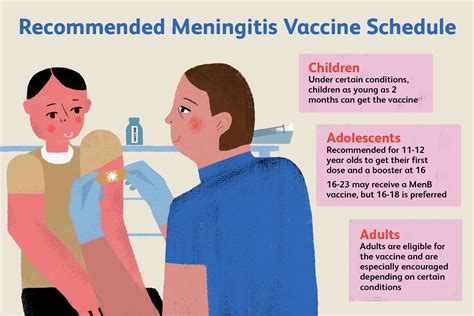
The meningitis B vaccine has been shown to be highly effective in preventing meningitis B disease. Studies have demonstrated that the vaccine can reduce the risk of meningitis B disease by up to 90%. The vaccine has also been shown to be effective in preventing outbreaks of the disease. For example, a study published in the Journal of the American Medical Association found that the meningitis B vaccine was highly effective in preventing meningitis B disease in a college population.
Meningitis B Vaccine and Pregnancy
The meningitis B vaccine is recommended for pregnant women who are at increased risk of contracting the disease. The vaccine has been shown to be safe and effective in pregnant women, and it can help to protect against severe complications of meningitis B disease. However, it is essential to consult with a healthcare professional before receiving the vaccine during pregnancy.Meningitis B Vaccine and Breastfeeding

The meningitis B vaccine is safe for breastfeeding mothers. The vaccine has been shown to be effective in preventing meningitis B disease in breastfeeding mothers, and it can help to protect against severe complications of the disease. However, it is essential to consult with a healthcare professional before receiving the vaccine while breastfeeding.
Meningitis B Vaccine and Travel
The meningitis B vaccine is recommended for travelers who are at increased risk of contracting the disease. The vaccine can help to protect against severe complications of meningitis B disease, which can be a significant risk for travelers. However, it is essential to consult with a healthcare professional before receiving the vaccine for travel.Meningitis B Vaccine and Outbreaks
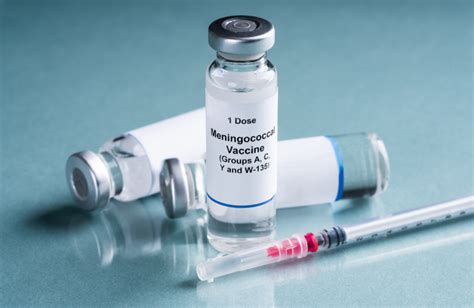
The meningitis B vaccine can help to prevent outbreaks of the disease. The vaccine has been shown to be effective in preventing meningitis B disease in vaccinated populations, and it can help to reduce the risk of outbreaks. For example, a study published in the New England Journal of Medicine found that the meningitis B vaccine was highly effective in preventing meningitis B disease in a college population, which helped to prevent an outbreak of the disease.
Meningitis B Vaccine and Public Health
The meningitis B vaccine has a significant impact on public health. The vaccine can help to prevent severe complications of meningitis B disease, which can have a significant impact on public health. The vaccine can also help to reduce the risk of outbreaks, which can have a significant impact on public health. However, it is essential to continue to monitor the effectiveness of the vaccine and to make adjustments as necessary to ensure that it remains effective in preventing meningitis B disease.Meningitis B Vaccine and Cost
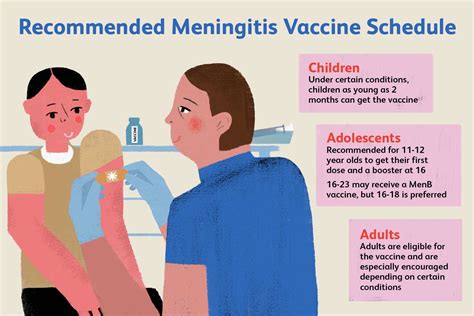
The cost of the meningitis B vaccine can vary depending on the location and the healthcare provider. However, the vaccine is generally considered to be cost-effective, especially when compared to the cost of treating meningitis B disease. The vaccine can help to prevent severe complications of the disease, which can have a significant impact on healthcare costs.
Meningitis B Vaccine and Accessibility
The meningitis B vaccine is widely available, and it is recommended for all individuals who are at increased risk of contracting the disease. However, there may be barriers to accessing the vaccine, especially in low-income and middle-income countries. It is essential to continue to work to improve access to the vaccine, especially in areas where the disease is common.What is the meningitis B vaccine?
+The meningitis B vaccine is a vaccine that helps to protect against meningitis B disease, which is caused by the bacterium Neisseria meningitidis serogroup B.
Who should receive the meningitis B vaccine?
+The meningitis B vaccine is recommended for all individuals who are at increased risk of contracting the disease, including infants, young children, and young adults.
What are the benefits of the meningitis B vaccine?
+The benefits of the meningitis B vaccine include high efficacy, safety, protection against severe complications, and reduced risk of outbreaks.
What are the common side effects of the meningitis B vaccine?
+The common side effects of the meningitis B vaccine include pain, redness, and swelling at the injection site, fever, irritability, drowsiness, loss of appetite, vomiting, and diarrhea.
How effective is the meningitis B vaccine?
+The meningitis B vaccine has been shown to be highly effective in preventing meningitis B disease, with a reduction in risk of up to 90%.
In conclusion, the meningitis B vaccine is a crucial tool in the prevention of meningitis B disease. The vaccine has been shown to be highly effective in preventing the disease, and it can help to protect against severe complications. It is essential to continue to work to improve access to the vaccine, especially in areas where the disease is common. We encourage readers to share this article with others, especially those who may be at increased risk of contracting the disease. By working together, we can help to prevent meningitis B disease and protect public health.
